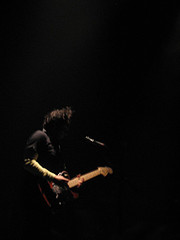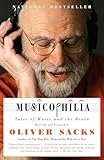I.
 I’m obsessed with music. There has rarely been a time in my life when this hasn’t been the case. Listening to music is one of the great pleasures of my life, seeing Leonard Cohen live in concert is my version of a religious experience, and discovering a new artist whose work I love makes me indescribably happy.
I’m obsessed with music. There has rarely been a time in my life when this hasn’t been the case. Listening to music is one of the great pleasures of my life, seeing Leonard Cohen live in concert is my version of a religious experience, and discovering a new artist whose work I love makes me indescribably happy.
I’ve long been interested by the interaction between music and memory: the way certain pieces of music can become indelibly imprinted with fragments of the past. I think we all have songs like this: R.E.M.’s “How The West Was Won and Where It Got Us” snaps me back to Toronto, night, walking along Danforth Avenue in the winter of 1997; it was my first winter away from home and I liked to go for long walks after school with New Adventures in Hi-Fi on my walkman. The Verve’s “Bittersweet Symphony” transports me to a particular party ten years ago in someone’s back yard, one of those magical long summer evenings with friends, that song playing again and again on the mix tape. I’ve been traveling fairly frequently lately, and when I arrive in a new hotel room one of the first things I do is plug in my laptop, open iTunes and fill the anonymous room with familiar music. I’m enamored with The National, but I’ve spent so much time listening to their albums with my husband that I find that I can’t listen to them when I’m traveling alone; their music makes me miss him too acutely.
 Most of us get tunes stuck in our heads on occasion, for hours or days; we are at times unable to stop ourselves from tapping our feet in response to a steady rhythm, even if it’s not the sort of thing we normally listen to; our brains sometimes present us with specific memories in response to specific songs. It seems clear that we’re hardwired for music, or that music is hardwired for us. “Our auditory systems,” Oliver Sacks writes in Musicophilia, his book on the interplay between music and the brain,
Most of us get tunes stuck in our heads on occasion, for hours or days; we are at times unable to stop ourselves from tapping our feet in response to a steady rhythm, even if it’s not the sort of thing we normally listen to; our brains sometimes present us with specific memories in response to specific songs. It seems clear that we’re hardwired for music, or that music is hardwired for us. “Our auditory systems,” Oliver Sacks writes in Musicophilia, his book on the interplay between music and the brain,
our nervous systems, are exquisitely tuned for music. How much this is due to the intrinsic characteristics of music itself—its complex sonic patterns woven in time, its logic, its momentum, its unbreakable sequences, its insistent rhythms and repetitions, the mysterious way in which it embodies emotion and “will”—and how much to special resonances, synchronizations, oscillations, mutual excitations, or feedbacks in the immensely complex, multilevel neural circuitry that underlies musical perception and reply, we do not yet know.
It’s a fascinating book. Sacks recounts tale after tale of music and neurology: epileptics whose seizures are triggered by churchbells; patients suffering from dementia who return fleetingly to lucidity when classical music is played; people with Tourette’s Syndrome who are freed from their involuntary outbursts only while they’re playing the piano.
Might our neurological alignment with music be used to our advantage? This idea isn’t new—you’ve probably heard of the Mozart Effect, but decades before Dr. Frances Rauscher and her colleagues published their 1993 article in Nature describing how exposure to Mozart’s double-piano sonata K448 temporarily increased spatial-temporal reasoning in their test subjects, the Bulgarian psychotherapist Dr. Georgi Lozanov was publishing books describing a method for learning foreign languages that he dubbed “Suggestopedia,” wherein students were exposed to 60-beat-per-minute baroque music—he claimed his technique allowed students to achieve fluency in foreign languages at near-superhuman speeds.
But new or not, the idea of using music as a tool is something I’ve been thinking about lately in relation to writing. Like a great many writers in this overly wired age, I sometimes struggle with focus. I’ll pause the writing to Google something (let’s say, oh, “spatial-temporal reasoning”, for example), and half an hour later I haven’t come back to the open Word document yet; I’m Googling something else or answering emails or updating my website or checking to see if anyone’s said anything interesting on Twitter in the past hour.
A while ago I began wondering if I might use music to my advantage somehow. Because if music exerts the sway over us that I think it does, if it might trigger not just memories but changes in one’s spatial-temporal reasoning ability, if in certain cases it can cause seizures and briefly neutralize Tourette’s syndrome, then perhaps, I thought, I might use it to help me ignore the distractions of the outside world and stay the hell off the Internet while I’m writing my third book.
II.
The generalized and ever-present temptation of the Internet aside, it seems to be a universal fact among writers I know that publication makes you suddenly, exponentially busier. I’m not complaining, let me hasten to add, but there are just far more emails to respond to, more deadlines, and more vaguely career-related/shamelessly self-promotional tasks to be performed than there ever was in my pre-publication life, and it’s alarmingly easy to get caught up in the vortex. There are a lot of days when it’s easy to become so focused on working on the career that working on the next novel seems like a bit of an afterthought, as if the writing of novels weren’t kind of the whole point here.
 In his book On Writing, Stephen King writes of the use of music in his workday. He listens “to loud music—hard rock stuff like AC/DC, Guns ‘n Roses, and Metallica have always been particular favorites—but for me the music is just another way of shutting the door. It surrounds me, keeps the mundane world out.”
In his book On Writing, Stephen King writes of the use of music in his workday. He listens “to loud music—hard rock stuff like AC/DC, Guns ‘n Roses, and Metallica have always been particular favorites—but for me the music is just another way of shutting the door. It surrounds me, keeps the mundane world out.”
I can’t personally imagine writing to Metallica, but I think he’s on to something here. Closing the door to my office is no longer enough for me, so I’ve been employing a new strategy over the past few months: an iTunes playlist, the songs chosen for their inobtrusiveness and steady quiet beat.
After listening to the playlist on a long endless loop through months of work on my third novel, I’ve increasingly found that I focus more easily when I’m listening to it. It’s partly that it helps to shut out the world, but I’ve come to realize that it’s also a trick of memory, an association forged between music and action. I believe this must be more or less the same function as those strange firings of neurons that make me think of a summer party when I hear “Bittersweet Symphony,” a winter night when I hear New Adventures in Hi-Fi, my husband when I listen to The National: after writing to this playlist for a while, these particular songs all make me think of my third novel.
It keeps me on track, even though in periods of intense writing I no longer hear it: I’ll put it on and begin writing, and then a while later I’ll come to and realize that an hour’s gone by and I’ve missed my favorite song. It’s mostly subdued electronica with a little classical music thrown in here and there, Underworld and Vivaldi and Radiohead. The earlier business of the day, the emails and research and promotion, can be performed to any particular music happens to strike my fancy; but when I hear the soft opening notes of Underworld’s “Glam Bucket,” I start falling back into the world of the new novel again.
[Image credit: elisasizzle]









